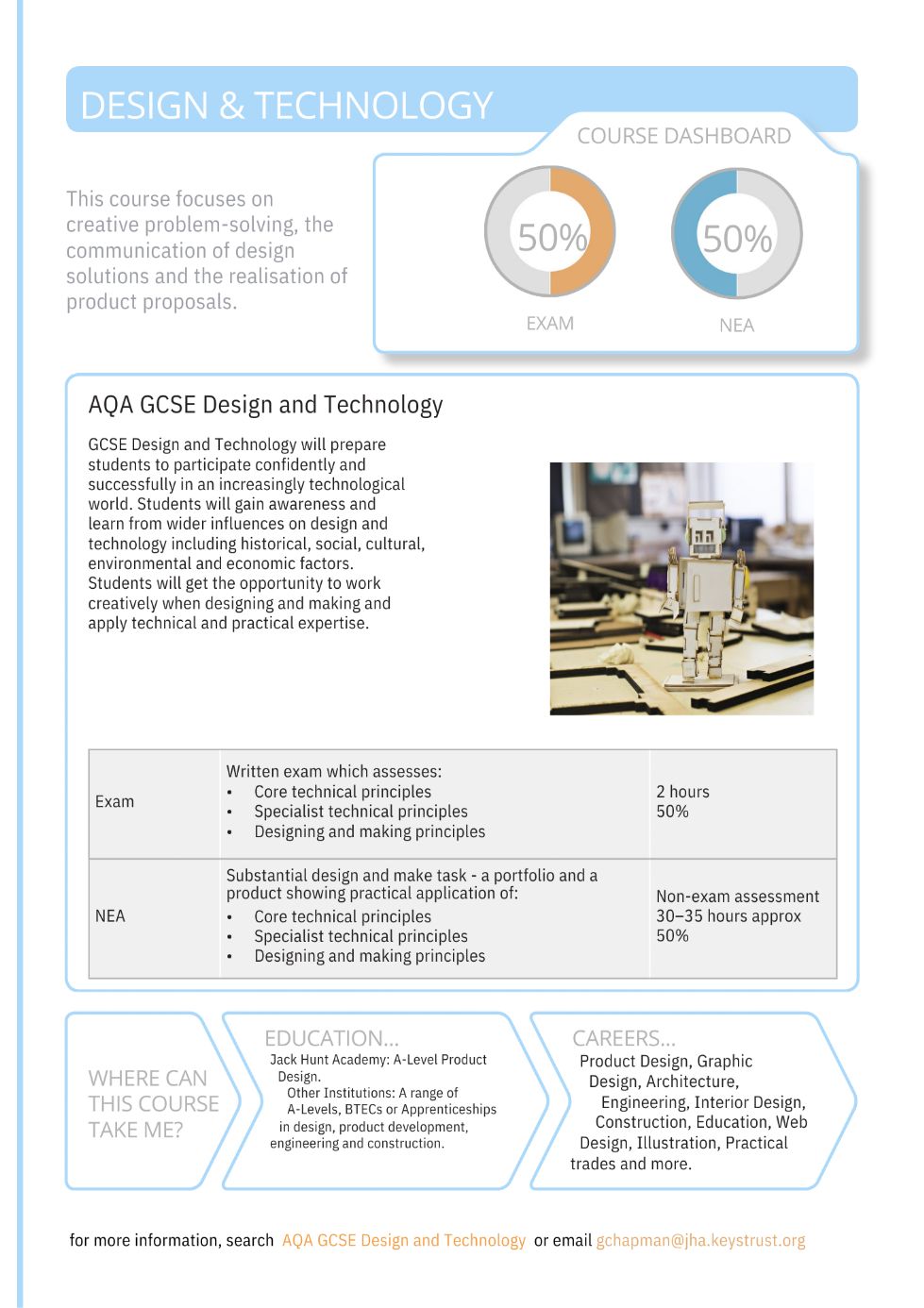DESIGN TECHNOLOGY
Students in KS3 will have a broad range of experience that will allow them to develop knowledge and practical skills, be able to problem solve, foster creativity and resilience. They are encouraged to make links to the wider world and how these skills can be transferred to everyday life.
Growing the designers, engineers, chefs and creatives of the future, who are confident and comfortable to function in a world of constant technological change. This through an increasingly challenging cycle of planning, designing, making and evaluating, whilst mastering an increasingly complex body of technical knowledge.
They will do this through the following material areas / disciplines:
Food
Foster a love of cooking so students can cook confidently, hygienically, safely for themselves and their families. Our curriculum enables students to explore new flavours, ingredients and traditions to make informed choices based on nutritional needs. Developing knowledge and understanding of key nutritional information to make informed choices.
DT
Students experience a new environment with a range of tools and machines. They develop an awareness of the design process, starting with design all the way through to evaluation. This helps them to understand how this may be approached in industry. Students work with design packages to enhance their learning experiences and product outcomes.
Textiles
Students are encouraged to develop their fine motor skills through textiles. They learn how to work with different materials and stitches, to design, construct and evaluate their own products. They learn a range of techniques to be able to create unique and detailed designs. Students develop an awareness of how techniques can be applied to a range of different products.
Students in Key Stage 4 can choose to study either Hospitality and Catering or Design and Technology as a GCSE option.
Within Design & Technology students will build on the knowledge and skills that they gained and developed at KS3. The subject encourages students to explore and understand global factors that affect the design, development and manufacture of products. Students gain further knowledge of the iterative design process using strategies to develop their problem-solving skills, ability to take risks and decision making.
The subject encourages students to design and make products that solve real and relevant problems, within a variety of contexts, while considering their own expertise of materials and manufacturing to meet the needs, wants and values of others’.
Within Hospitality and Catering, students will build on the knowledge and skills that they gained and developed at KS3. The subject encourages students to explore real life situations to gain an insight into the Hospitality and Catering industry. Students will develop their practical skills and ability to menu plan for different establishments and customers, considering nutritional needs and suitability of dishes. Students will develop their problem-solving skills and be able to adapt to ever changing circumstances.
key stage 3
Aims of the curriculum area
• To provide rich, stimulating and varied learning experiences for students so that they are able to problem solve, design and realise their designs with confidence.
• To develop a sound knowledge of designing and manufacturing including the use of ICT.
• To understand and appreciate the impact of design and technological development upon society. TEACHING METHODS
• Whole class teaching
• Student centred learning
• Group work
• Problem solving
• Working independently
• Investigatory working
resources
• Three multi-material workshops
• Two fully functioning kitchens
• Sewing machines
• Machine and casting area
• Access to ICT facilities including laser cutters and a 3D printer
• A variety of teacher prepared worksheets
• A range of text books covering all material areas at Key Stage 3, 4 and 5.
key stage 3 curriculum outline
KEY STAGE 3 CURRICULUM OUTLINE
• Year 7 students undertake a foundation course in Design and Technology, Food and Nutrition and Textiles.
• Year 8 rotate across three material areas ; DT, Food and Textiles
• Year 9 rotate across three material areas ; DT, Food and Textiles
AFTER KEY STAGE 3
• Years 10 and 11 students may choose to study Level 1 / 2 Hospitality and catering or GCSE Design and Technology.
• Examination courses include:- AQA GCSE Design and Technology, WJEC Level 1 / 2 Hospitality and catering.
• Years 12 & 13 students may choose level 3 Product Design. OTHER ACTIVITIES
• GCSE and A Level support sessions
• At lunchtimes the department is open and staff are available for guidance.
KEY STAGE 4

Ambitions & outcomes
-
Students confident in creating innovative, functional solutions.
-
Prepared for higher education, apprenticeships, and industry.
-
Independence, resilience, reflective practice.

